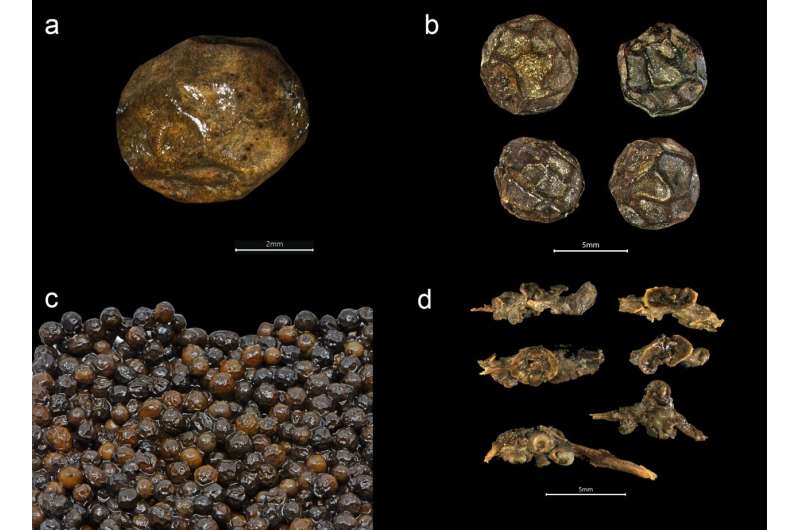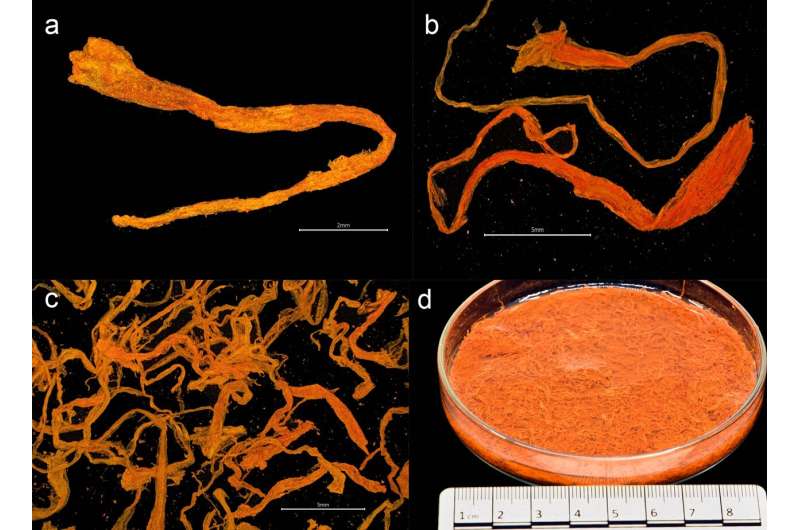Trove of spices from around the world on sunken fifteenth-century Norse ship
[ comments ]
by Bob Yirka , Phys.org

A pair of archaeologists with Lund University in Sweden has found "a treasure trove" of plants aboard a sunken 15th-century Norse ship. Mikael Larsson and Brendan Foley describe their findings in PLOS ONE.
In 1495, Danish King Hans docked his ship Gribshunden off the coast of Sweden in preparation for a meeting with Swedish ruler, Sten Sture the Elder. His plan was to broker a deal that would give him control over Sweden as he had done with Norway, creating a united Nordic kingdom. Unfortunately for Hans and many of his crew, the ship caught fire and sank. To give himself the upper hand, the King had filled his ship with both warriors and goods worthy of a rich and powerful man. The loss of the ship led to a change in plans—Hans attacked Sweden soon thereafter and conquered the country instead of negotiating for it. But the sinking of the ship also created a motherlode of artifacts for modern historians to study.
The wreck of the ship was found in the 1960s and was studied by marine archaeologists in the years thereafter, but not very thoroughly. The new study was launched in 2019 and continued through 2021. The team found that most of the expected artifacts had already been found in earlier expeditions, but something important had been overlooked—containers holding well-preserved plant material—more than 3,000 specimens.

The researchers found spices such as nutmeg, cloves, mustard and dill. They also found samples of other plant material, such as saffron and ginger, peppercorns and almonds. Some of the spices would have come from as far away as Indonesia, suggesting that King Hans had developed an advanced trade network. The researchers also found snack items, such as dried blackberries, raspberries, grapes and flax, each find showing just how rich and powerful Hans had become. The researchers also found one non-edible plant, henbane, which, in the past, was used for medicinal purposes.
The researchers note that the plant specimens were in excellent condition due to the unique conditions of the site where the ship was found, a part of the Baltic Sea that is cold and low in salinity.
More information: Mikael Larsson et al, The king's spice cabinet–Plant remains from Gribshunden, a 15th century royal shipwreck in the Baltic Sea, PLOS ONE (2023). DOI: 10.1371/journal.pone.0281010
© 2023 Science X Network
Beach erosion: Satellites reveal how climate cycles impact coastlines
New models shed light on life's origin
Researchers use water treatment method to capture acids from agricultural waste
Researchers detail never-before-seen properties in a family of superconducting Kagome metals
Evidence that deep-sea black carbon comes from hydrothermal vents
Researchers build more detailed picture of the movement of the Greenland Ice Sheet
Neuroscientist investigates social cognition in biased juries
Scientists develop graphene aerogel particles for efficient water purification
Does increasing farm productivity relieve pressure on remaining natural areas? Study suggests only among native people
A liquid laser that is robust in air and tunable by wind
Let us know if there is a problem with our content
Use this form if you have come across a typo, inaccuracy or would like to send an edit request for the content on this page. For general inquiries, please use our contact form. For general feedback, use the publicsection below (please adhere to guidelines).
Please select the most appropriate category to facilitate processing of your request
Thank you for taking time to provide your feedback to the editors.
Your feedback is important to us. However, we do not guarantee individualdue to the high volume of messages.
E-mail the story
Trove of spices from around the world found on sunken fifteenth-century Norse ship
Note
Your email address is used only to let the recipient know who sent the email. Neither your address nor the recipient's address will be used for any other purpose. The information you enter will appear in your e-mail message and is not retained by Phys.org in any form.
Newsletter sign up
Get weekly and/or daily updates delivered to your inbox. You can unsubscribe at any time and we'll never share your details to third parties.
[ comments ]
